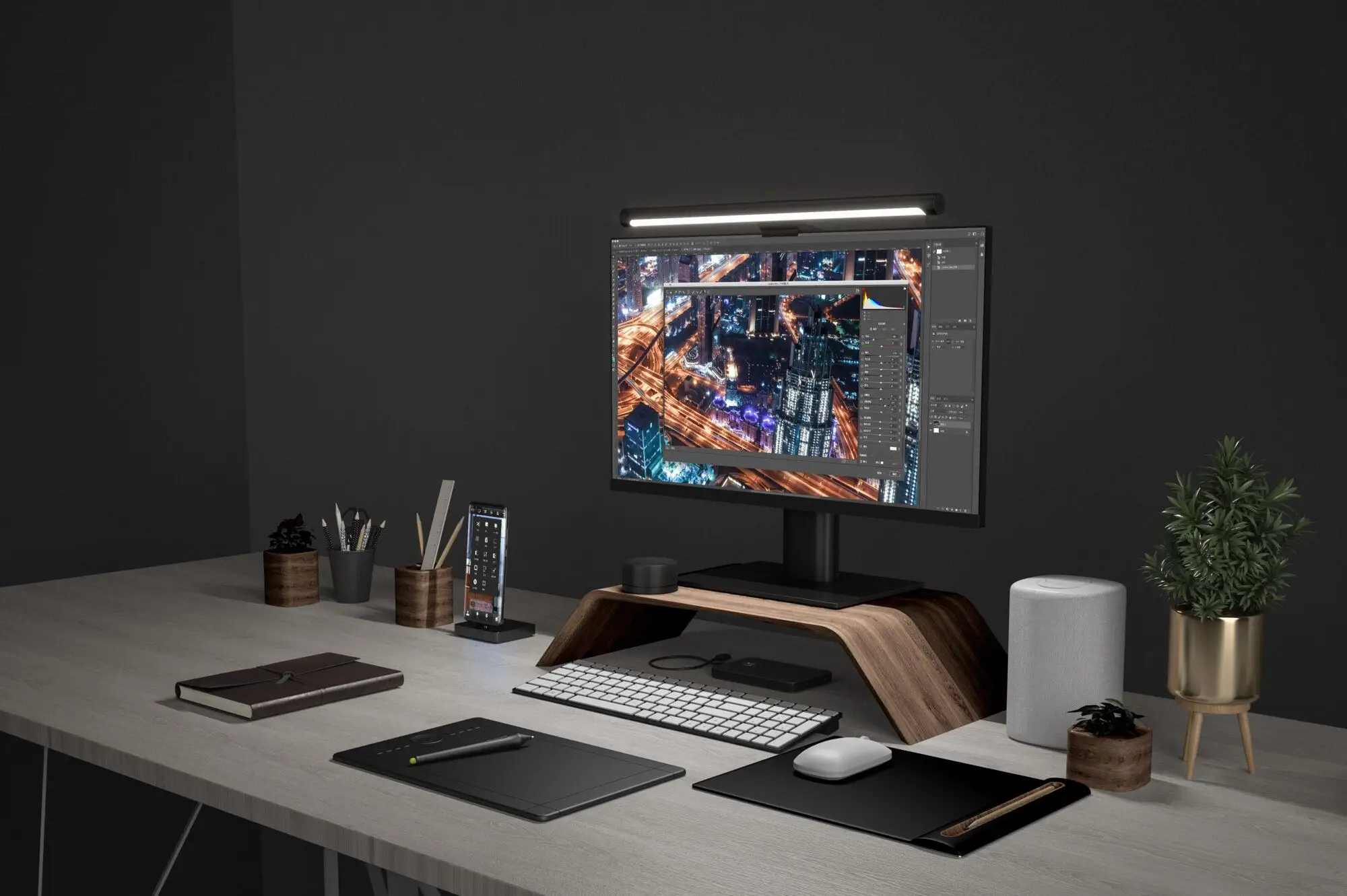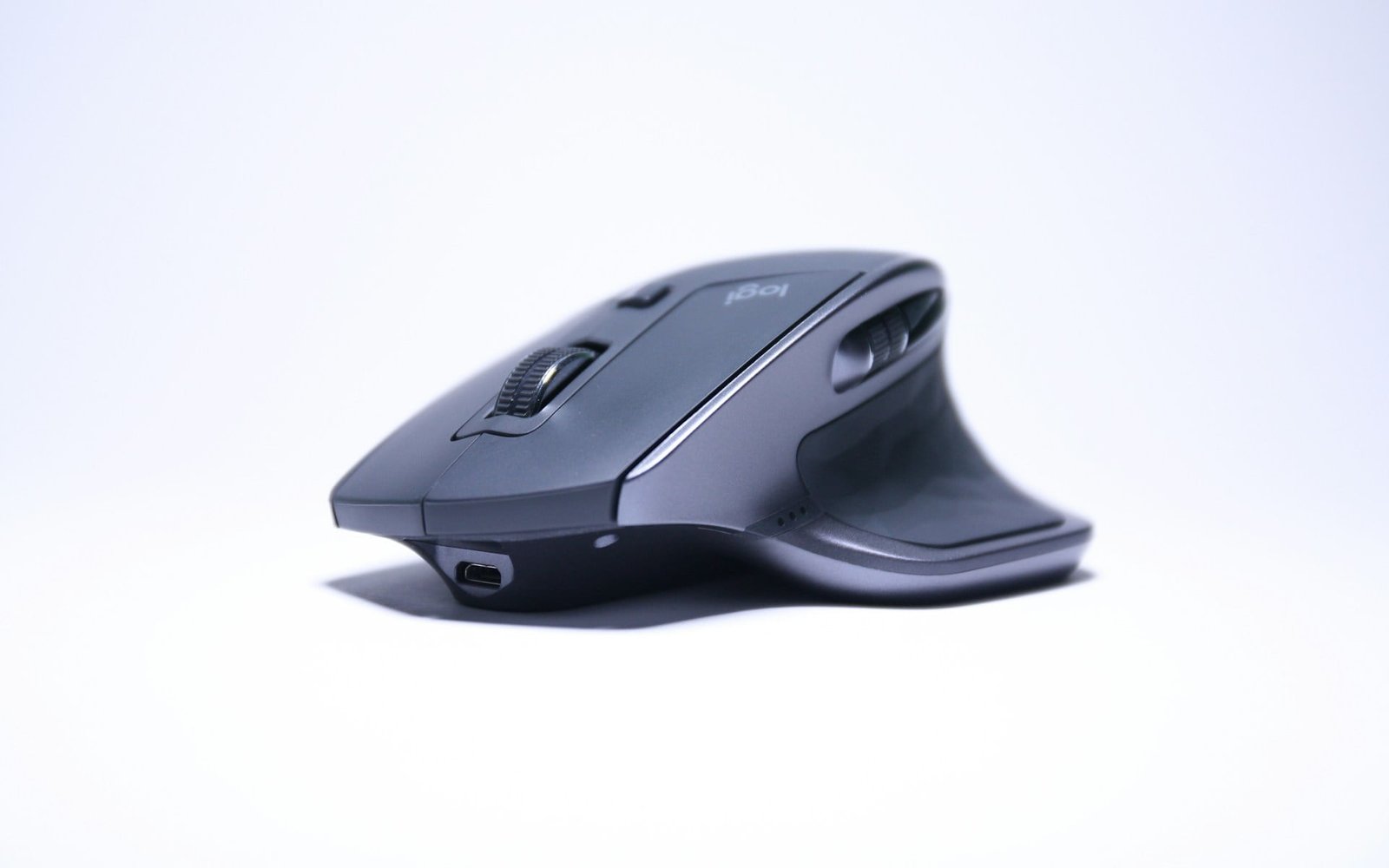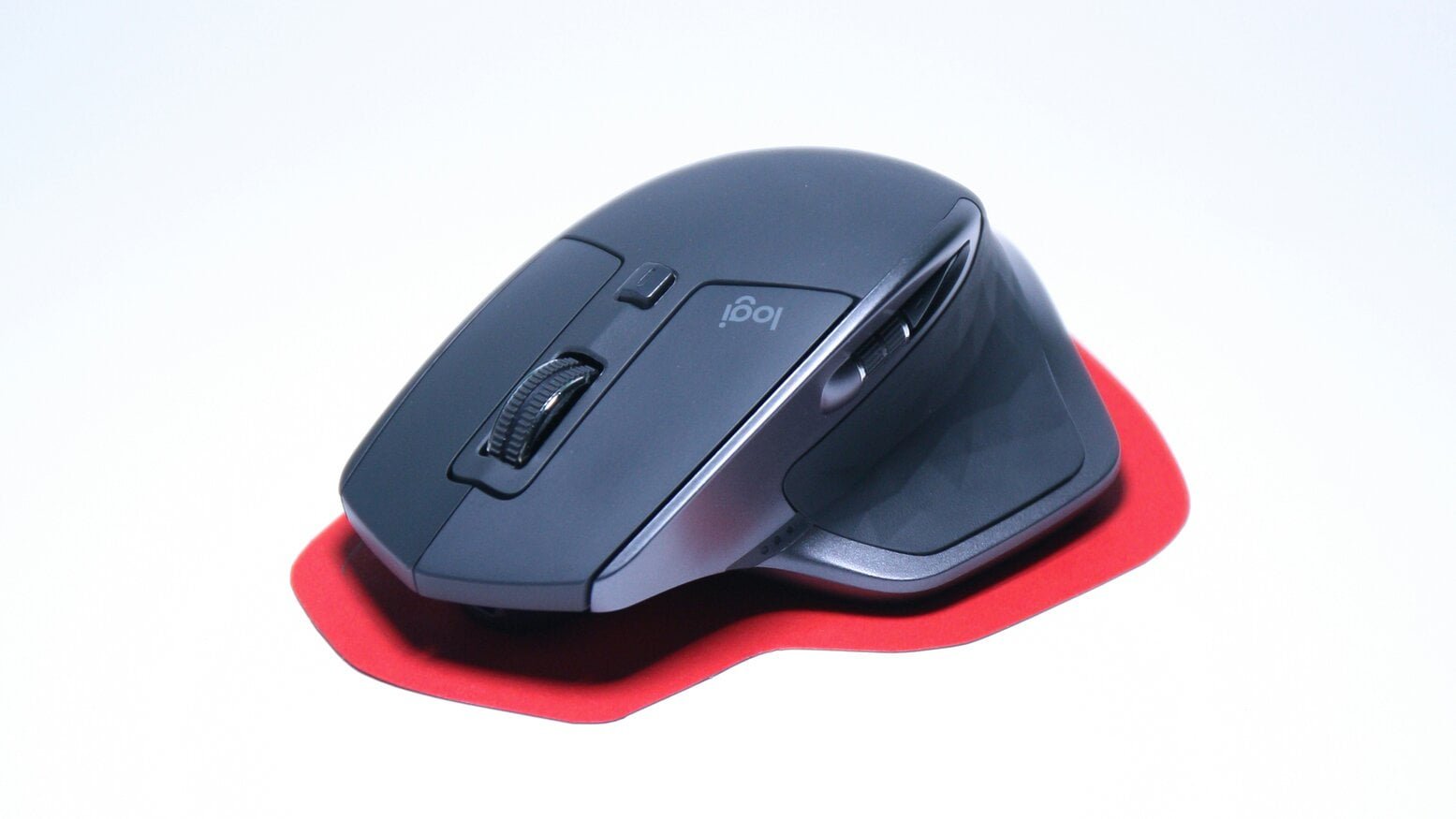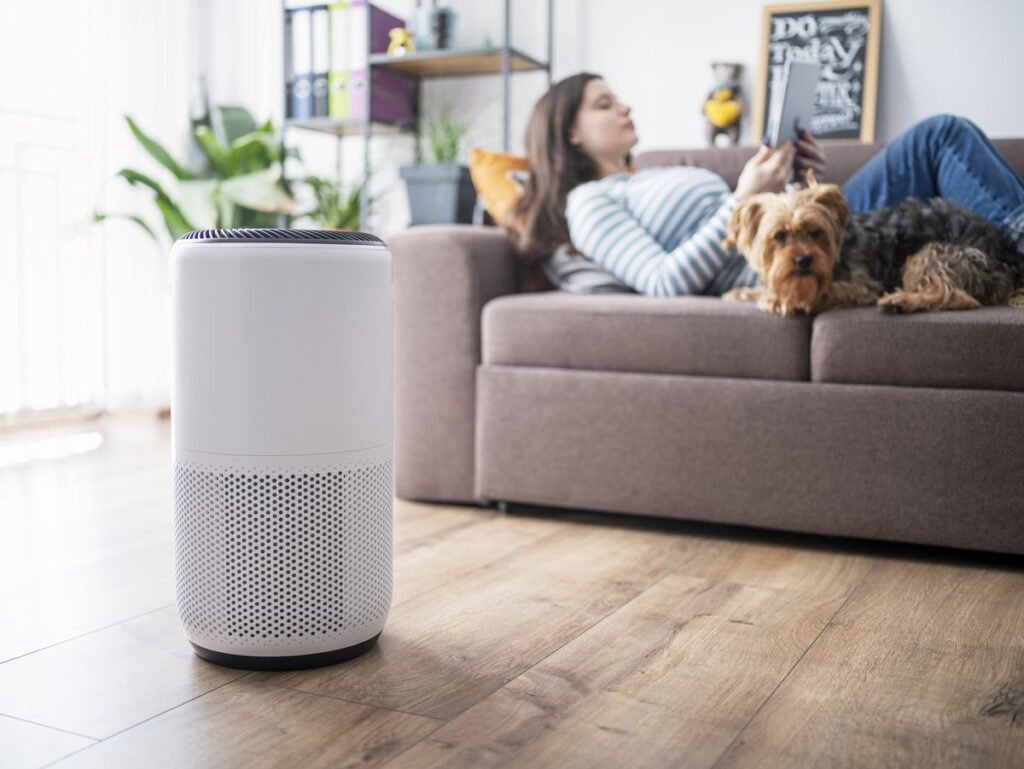
Air purifiers have become increasingly popular as an essential component in maintaining a healthy indoor environment. They operate by filtering out pollutants, allergens, and toxins from the air, providing a cleaner and more breathable space.
With the average person spending a significant amount of time indoors, the quality of indoor air can have a substantial impact on health and well-being.
Air purifiers with High-Efficiency Particulate Air (HEPA) filters are particularly adept at capturing a high percentage of airborne particles, including those as small as 0.3 microns.
The benefits of an air purifier extend beyond just cleaning the air. They play a pivotal role in mitigating allergy and asthma symptoms by removing common triggers such as pollen, dust mites, and pet dander from the environment.
Additionally, some purifiers are equipped with activated carbon filters that are effective at absorbing odors, smoke, and volatile organic compounds (VOCs), further enhancing the living space.
The convenience of portable air purifiers also means that they can be used effectively in different rooms as needed, ensuring consistent air quality throughout the home.
Check out our latest guide where we reviewed the best air purifiers for your home “The 5 Best Air Purifiers for Home Use in 2024“
Key Takeaways
- Air purifiers filter out numerous airborne pollutants, supporting overall indoor air quality.
- They are especially beneficial for individuals with allergies and asthma by removing irritants.
- Portable units offer adaptable solutions to maintain consistent air quality in various settings.
Understanding Air Purifiers and How They Work
Air purifiers are essential for maintaining indoor air quality by removing contaminants and improving the health of occupants. This section explores the various types of air purifiers and their core components, highlighting how they function to purify the air we breathe.
Types of Air Purifiers
- HEPA Air Purifiers: These devices incorporate a dense paper filter to trap particles such as pollen, dust mites, and pet dander effectively, eliminating up to 99.97% of airborne allergens.
- UV Light Air Purifiers: These purifiers use ultraviolet light to inactivate airborne pathogens and microorganisms like bacteria and viruses.
- Electronic Air Cleaners: These include electrostatic precipitators and ionizers that use an electrical charge to remove particles from the air.
Key Components: Filters and Technologies
- HEPA Filters: Considered the gold standard, HEPA filters must meet strict efficiency standards, capturing particles as small as 0.3 microns.
- Activated Carbon Filters: Often paired with HEPA air filters, these absorb odors, gases, and volatile organic compounds (VOCs), providing an additional layer of purification.
- UV-C Technology: Implements ultraviolet light to target and neutralize microscopic organisms, complementing the physical filtration process.
- Air Purifier Design and Fan Speeds: The effectiveness of air purifiers also depends on their design, including how air flows through the unit and the speed at which the built-in fan operates, which affects how quickly air is purified.
Improving Indoor Air Quality
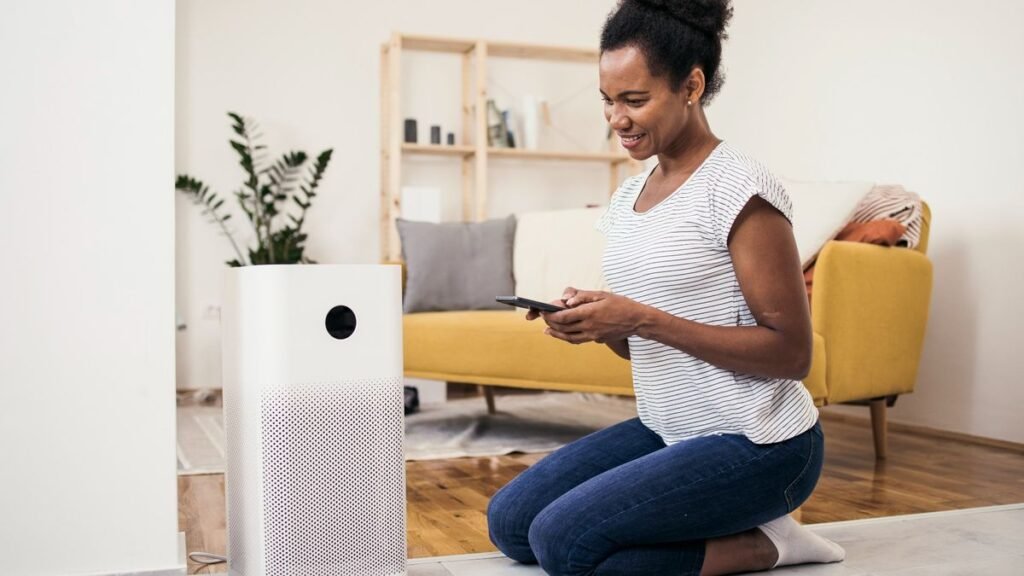
When considering the benefits of air purifiers, their significant role in improving indoor air quality is paramount. They serve as a vital tool in reducing indoor air pollution and providing relief to those who suffer from allergies and asthma.
Combat Indoor Air Pollution
Indoor air pollution is comprised of various irritants and particles like dust mites, pet dander, and pollen.
An air purifier can help mitigate these pollutants by cycling the air through filters that capture fine particulate matter.
Specifically, HEPA filters are known to trap up to 99.97% of airborne particles, ensuring that the air remains clean.
Benefits for Allergy and Asthma Sufferers
Those with allergies or asthma can find significant relief through the use of air purifiers.
These devices not only remove common allergens but also improve overall indoor air quality, which is critical for individuals with respiratory sensitivities.
By capturing allergens such as dust mite particles, air purifiers help to alleviate symptoms and contribute to a healthier breathing environment.
Health Benefits of Clean Air
Clean air has definitive health advantages, notably by mitigating respiratory issues and reducing the risk of contracting airborne diseases. High-quality air purifiers can contribute significantly to maintaining a clean indoor environment.
Reduction in Respiratory Issues
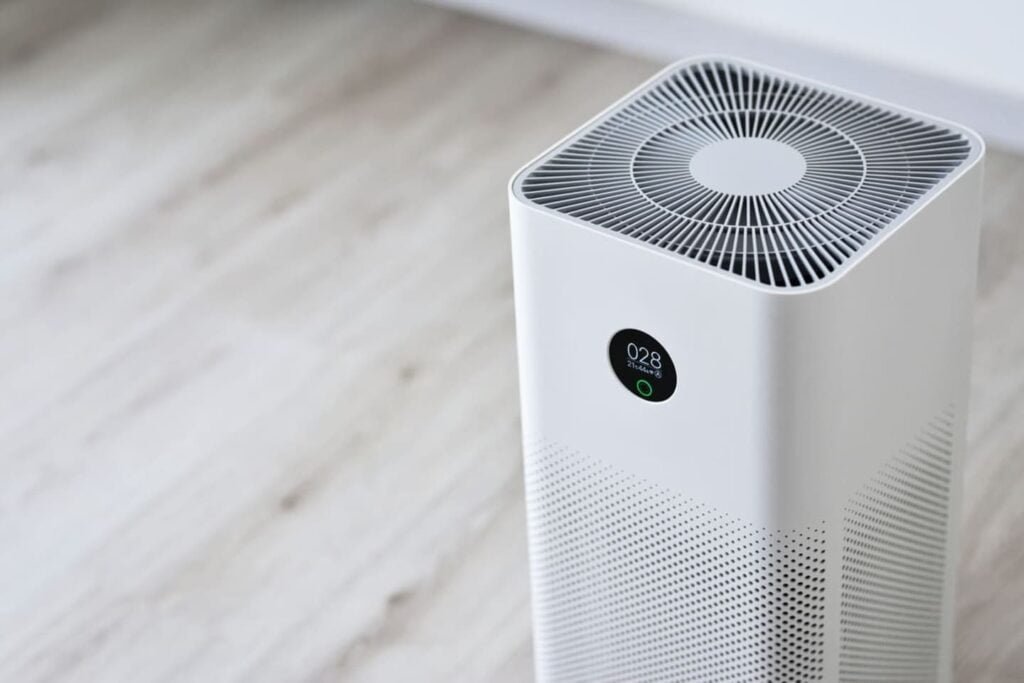
Air purifiers are designed to filter out irritants and airborne particles such as pollen, pet dander, and dust mites.
This filtration process is crucial for individuals with asthma or allergies as it provides a cleaner breathing environment, which can help in alleviating respiratory symptoms.
Devices with HEPA (High-Efficiency Particulate Air) filters are especially effective, capable of removing up to 99.97% of these airborne allergens.
Lower Risk of Airborne Diseases
One’s risk of airborne diseases is intimately connected to the quality of air inhalation.
Cleaner air minimizes exposure to pathogens such as viruses and bacteria that can travel through the air.
Air purifiers with the proper filtration technology can reduce the circulation of these pathogens, thus potentially lowering the incidence of airborne diseases in a given indoor environment.
This underscores the importance of maintaining optimal air quality for health protection.
Effectiveness Against Common Pollutants
Air purifiers are designed to improve indoor air quality by capturing a wide range of common pollutants. This includes fine particles such as pet dander and hair, as well as airborne elements from smoke and odors that can affect health and comfort.
If you need an air purifier that’s suitable for you, check out our latest guide “The 5 Best Air Purifiers for Home Use in 2024“
Capturing Pet Dander and Hair
Air purifiers equipped with HEPA filters are particularly effective at trapping pet dander and hair. These filters can capture up to 99.97% of airborne allergens:
- Pet dander: Small, often microscopic, flecks of skin shed by cats, dogs, rodents, birds, and other animals with fur or feathers.
- Hair: While pet hair is not an allergen, it can carry dander, dirt, and other allergens.
Filtering Smoke and Odors
In addition to particulate matter like dander, air purifiers can also clean the air of smoke and odors:
- Smoke particles: These can come from wildfires, cigarettes, or burning wood, and can be effectively reduced in size and concentration.
- Odors and gases: Activated carbon filters within air purifiers absorb odors, as well as gases and volatile organic compounds (VOCs) that can cause health issues.
The Convenience of Portable Air Purifying Solutions
Portable air purifiers offer a flexible alternative to traditional air purification systems, making them a practical choice for individuals needing clean air on-the-go.
Advantages of Portable Units
Portable air purifiers stand out due to their ease of transportability and versatility in use.
These units can be easily moved from room to room, allowing users to target specific areas where air quality may momentarily be of greater concern, such as kitchens during cooking or in living areas where pets reside.
Designed to be compact, they do not require complex installation processes, which may appeal to renters or those frequently changing their living arrangements.
Importantly, some models are capable of making multiple air changes per hour even in medium to large rooms, ensuring a sustained level of air quality wherever positioned.
Maintenance and Placement Tips
When it comes to maintaining a portable air purifier, regular upkeep is essential to ensure it functions efficiently.
Filters should be replaced or cleaned according to the manufacturer’s guidelines, which is typically straightforward.
Placement also plays a critical role in effectiveness; they should be positioned where air can circulate freely around them, avoiding confined spaces:
- Avoid corners: Keep the air purifier away from corners and furniture to maximize air intake.
- Elevate when possible: Place on a table or shelf to distribute purified air more evenly.
- Central location: For general use, a central location can help maintain consistent air quality across the room.
Selecting the Right Air Purifier for Your Home
Selecting the right air purifier involves understanding room size considerations and the specific needs of your indoor environment to ensure optimal air quality.
Considering Room Size and Purifier Capacity
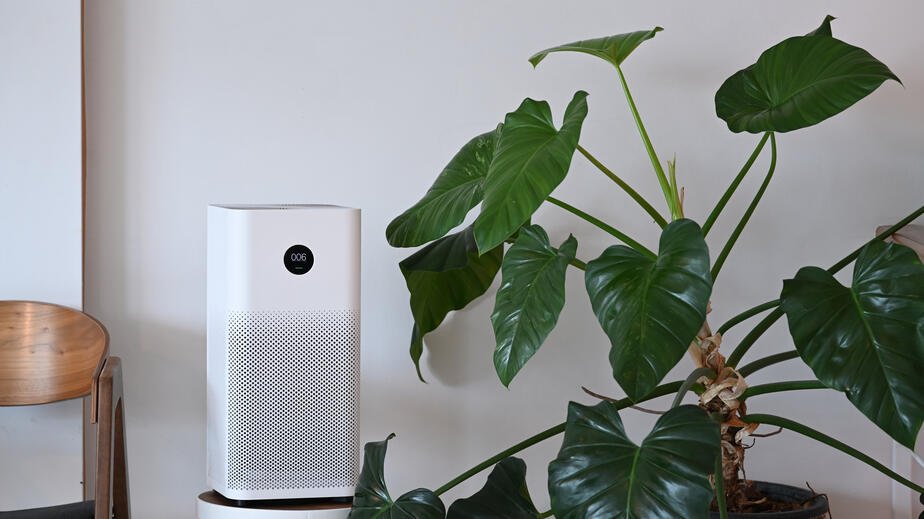
When hunting for the best air purifier, one must start by measuring the room where the purifier will be used. Air purifiers are designed to filter air efficiently within a certain area, measured in square feet.
- Measure your room: Identify the length and width of your space and multiply to find the square footage.
- Check purifier capacity: Choose an air purifier with a recommended coverage area that matches or exceeds your room size.
Manufacturers typically specify the maximum size of the area where their air purifiers can operate effectively. For example, an efficient air purifier might be rated for spaces up to 500 square feet, making it suitable for a medium-sized living room or bedroom.
Understanding the Specific Needs of Your Indoor Environment
Different indoor environments may have various air quality issues, ranging from dust and pet dander to smoke and pollen.
Air purifiers with HEPA filters are often considered the most effective, as they can capture 99.97% of airborne particles as small as 0.3 microns.
- Identify indoor air pollutants: Assess which contaminants are most prevalent in your home.
- Select a purifier with relevant filters: Look for devices that target your specific air quality challenges.
For instance, a household with pets might benefit from using an air purifier with a HEPA filter specifically designed to trap pet dander and hair. Meanwhile, homes in urban areas might prioritize a model adept at filtering out pollution and smoke.
Always refer to the product specifications to ensure the purifier is equipped to handle your indoor air quality needs.
Sustainability and Energy Efficiency
When considering air purifiers, sustainability and energy efficiency stand out as significant benefits. An air purifier enables the maintenance of cleaner indoor air while also emphasizing the importance of environmental responsibility.
Fan Speeds: Air purifiers often come with adjustable fan speeds, which influence both energy consumption and overall efficacy:
- Higher Settings:
- Increased air filtration rate
- Higher energy use
- More noise generated
- Lower Settings:
- Reduced noise
- Decreased energy consumption
- Slower air filtration
Investing in an air purifier with Energy Star certification can lead to long-term sustainability and cost benefits.
These models are designed to be more energy-efficient than traditional models, thereby reducing one’s carbon footprint while also diminishing operational costs.
Filter Types:
- HEPA Filters: High Efficiency Particulate Air filters (HEPA) are notable for their proficiency in trapping fine particles without sacrificing energy efficiency.
The use of advanced technologies in air purifiers, such as smart sensors, can further optimize energy usage.
These sensors adjust settings in real-time, ensuring that air purifiers are active only when necessary, which mitigates unnecessary energy use and contributes to a prolonged lifespan of the unit.
Conclusion: Making an Informed Decision
When selecting air purifiers, consumers typically consider various factors such as effectiveness, ease of use, maintenance needs, and cost.
Air purifiers are considered advantageous for a multitude of reasons, with performance and efficiency being paramount among them.
It is crucial to understand the top benefits of air purifiers in order to make a well-informed decision.
The primary functions that air purifiers include are:
- Removal of Particulate Matter: They are adept at capturing fine particles such as dust, pollen, and pet dander.
- Reduction of Odor: Activated carbon filters target and neutralize unpleasant odors and gaseous pollutants.
- Mitigation of Allergic Reactions: By reducing common allergens, air purifiers can alleviate symptoms associated with allergies and asthma.
In summary, air purifiers have been acknowledged for their ability to:
- Cleanse the air from common airborne allergens.
- Absorb odors and harmful chemicals, thus improving indoor air quality.
- Contribute to a healthier living environment by reducing the presence of irritants.
Prospective buyers should evaluate these benefits in the context of their individual needs.
Whether one is looking to improve general health, reduce allergy symptoms, or simply wishes for a fresher living space, air purifiers offer an array of advantages.
By understanding the capabilities and limitations of different air purifier technologies, consumers can make confident choices about investing in air quality solutions suited to their environments.
Frequently Asked Questions about the Benefits of Air Purifiers
1. What are the benefits of using an air purifier?
Using an air purifier can help improve indoor air quality by removing air pollutants such as dust mites and pet dander, resulting in cleaner air for you and your family to breathe.
2. How do air purifiers work to improve air quality?
Air purifiers work by filtering out particulate air contaminants using advanced hepa filters which can remove even the smallest particles in the air, thus purifying the air in your home or office.
3. Can air purifiers help reduce indoor air pollution levels?
Yes, air purifiers can effectively reduce indoor air pollution levels by cleaning the air and removing harmful airborne particles, ultimately improving your indoor air quality.
4. Are portable air purifiers efficient in purifying the air?
Portable air purifiers are designed to be efficient in cleaning the air in smaller spaces, making them a convenient option for keeping the air in your personal environment clean and fresh.
5. What are the benefits of using HEPA air purifiers?
HEPA air purifiers are highly effective in air filtration as they can remove up to 99.97% of airborne particlescleaner air in your home or office.


